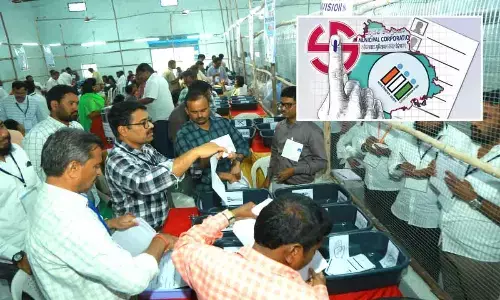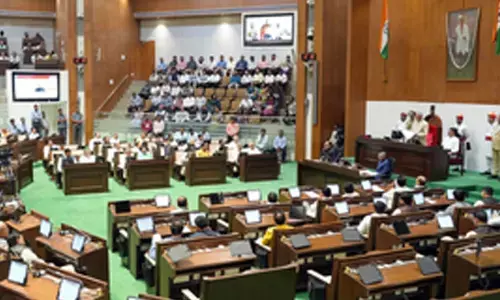Democracy: A Failed Export

Representational Image
The world is not homogenous and can’t be made into one, ever. The United States of America has failed to understand fundamental cultural variables which drive different governance models across the world. USA should have learned early that ‘One size doesn’t fit all.’
The world is not homogenous and can't be made into one, ever. The United States of America has failed to understand fundamental cultural variables which drive different governance models across the world. USA should have learned early that 'One size doesn't fit all.'
Unfortunately, the modern world fancies democracy as the only viable governance model, as they haven't experienced better models in the past. The western nations and especially United States of America's intent to transform all nations of this world into democracies is a juvenile attempt and a daydream which can't be realised.
If one analyses successfully ageing democracies, it is apparent that all these nations have strong cultural fundamentals of tolerance and defined social values. Nations which have the history of authoritarian and hybrid regimes can neither understand the spirit of democracy nor can implement democratic governance. There are many historic failed examples worldwide on how democracy cannot be exported to other nations.
India for instance was not a democracy prior to 1947. However, 800 years prior to foreign occupation, this geography was ruled by kings who were more than democratic in their model of governance. The cultural fundamentals of India for centuries were of tolerance, simplicity, divinity, self-sufficiency, universal harmony and knowledge.
After 1947, ancient values of this civilisation could easily allow India to adopt democracy and continue successfully for so long as the largest, vibrant and a functional democracy.
If nations which don't have cultural fundamentals of mutual respect, tolerance, social harmony and other values which are essential for a democracy to function, one cannot be forced to be a democratic nation by others selling it hard.
A Recipe For Disaster
Afghanistan is a fresh example of USA's mis-adventure to export democracy. Foreign entities cannot incorporate governance models for a nation and expect its people will follow them.
Democracy is a mind-set. It could be the best possible governance model available to the world now, and some democracies like USA, UK, Germany and France might feel it suits entire world ideally. However, it is a fact that not all nations wish to affiliate or subscribe to this model.
Only 49% of nations in the world have adopted democratic governance system. Out of them only 19% seem to be truly functional democracies, and the rest 30% are either flawed or dysfunctional democracies. It leaves us with around 51% of nations which are completely non-democratic.
China, UAE, Saudi Arabia, Vietnam, Jordan and many other non-democracies are still vibrant economies, and have showcased competent metrics of social and economic development. China with a differential governance, social and economic model other than a democracy, has even become a global super power.
Altering a nation's character with a presumption that all human beings have similar aspirations, and can achieve them through a singular approach is certainly flawed. This cultural and political prejudice can be a recipe for a huge disaster.
Reverse Engineering
Imagine if China were to export their governance model to other nations, which they occupy through their military might or debt diplomacy in the near future.
From President Joe Biden's recent press briefing, USA seems to have realised after many decades, that democracy is not a 'saleable commodity.' Neither USA, its allies nor any other nation can shape future course of a nation positively by forcefully altering governance structures, even with a good intention.
Historic failures from Vietnam, Iraq, Syria, Libiya, Egypt and recently Afghanistan teaches grand lessons, to not meddle with natural and culturally developed governance models of nations.
Nations Destroyed
I can understand a war destroying a nation. I can even understand a nation attacking another nation, in a pre-emptive or a reactive scenario. However, occupying a nation to change its fundamental structure is a foolish enterprise.
Mindless initiatives of 'building nations' has led many nations in the recent history into horrifying chaos, violence, poverty and destabilised millions of lives forever. Common people who have no control over political and military decisions have become subjects of inexplicable pain and agony.
Global Outcomes
Afghanistan today stands as a broken nation with no possibility of repair in the near future. It is heartbreaking to see the plight of its innocent citizens who are trying to flee this war-torn nation with their families, with an unimaginable fear. Shocking images of hordes of people clinging on to the side of a C17 aircraft, displays the unprecedented desperation of Afghan citizens.
Developments like this impact not just a nation but also the neighborhood, region, sub-continent and even an entire continent. The outcome of this mess is global and can destabilise political, social and economic course of many nations in the region.
Situations like this also provide opportunities to nations with expansionist intentions to exploit the situation, and 'fish in shallow waters' for their selfish geo-political ambitions.
USA, its formal and informal allies in Europe and elsewhere should realise that Democracy is not an 'exportable commodity.' Unilaterally trying to impose this model on random nations will not just imminently fail but also can lead to huge global events, which will displace and destroy millions of lives across the world.
(The author is the chief spokesperson of the BJP Telangana State, an organisational strategist & a leadership coach)
(The opinions expressed in this column are that of the writer. The facts and opinions expressed here do not reflect the views of The Hans India)









